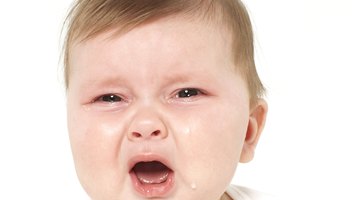Green Stool in a Teething and Nursing Baby
A breastfed baby’s stools vary daily in color, consistency and frequency. A bright green stool in your teething baby is well within what is considered normal for breastfed babies, and often results from dietary causes. Green stool in a teething breastfed baby is rarely a cause for medical concern, and usually requires no medical treatment.
Dietary Causes
Feeding your baby foods containing food coloring and other chemical food additives, such as grape flavored Pedialyte, soft drinks, gelatin or ice pops is a common cause of green stool, explains the St. Louis Children’s Hospital website. Using grape-flavored pain relievers to reduce teething symptoms in your baby is another cause of green stools. Iron supplements and infant vitamin drops are another common cause of green stools in breastfed babies. If your baby has recently started eating green vegetables such as peas or green beans, this is another cause of greenish stools.
Medical Causes

Stringy Mucus During Breast-Feeding
Learn More
What you eat affects the appearance and frequency of your breastfed baby’s stools, especially if your baby has an allergy to a food that you consume. Breastfeeding mothers that consume cow’s milk or other dairy products pass cow’s milk proteins into their breast milk, which sometimes triggers an allergic reaction in baby, leading to green stool. Teething often increases the amount of saliva your baby produces and swallows, leading to a greenish and looser stool. Bile in stools, common when babies have diarrhea due to a viral infection, often result in green bowel movements. Rarely, an imbalance of foremilk and hindmilk leads to green stools in breastfed babies.
Treatments
You do not need to stop breastfeeding if your baby’s stool turns green. If you suspect your baby has a food allergy to something in your diet, work with your doctor or pediatrician to eliminate foods one at a time to determine the problem food. If your baby has green-colored diarrhea, offer her bland foods such as frozen cubes of banana or homemade ice pops made with yogurt to suck or teethe on once her stools have returned to their usual frequency, and continue breastfeeding on demand.
Prevention

Breastfeeding and Acidic Smell From Bowel Movements
Learn More
Green stools resulting from diarrhea usually resolve once the diarrhea ends, although your baby might need additional fluids such as clear electrolyte solution or more frequent nursing to prevent dehydration. Switch to a dye-free pain reliever to ease your baby’s teething symptoms if the green color of her stools resulting from food colorings is bothersome. In the case of foremilk and hindmilk imbalance, express your milk from each breast for a minute or two and then latch your baby, as this removes some of the excess foremilk, or work with a lactation consultant to resolve the issue.










